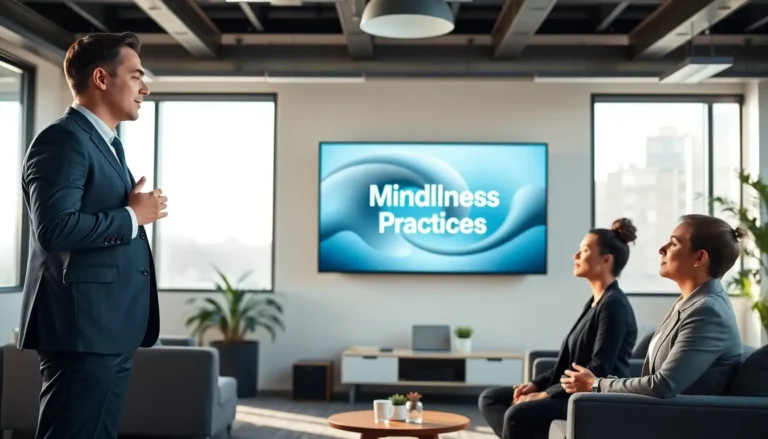Table of Contents
ToggleIn a world buzzing with distractions and endless to-do lists, finding your Zen can feel like searching for a needle in a haystack. But fear not! Cutting-edge mindfulness practices are here to rescue stressed-out souls from the chaos. These innovative techniques aren’t just your grandma’s meditation; they blend ancient wisdom with modern science to help anyone tap into their inner calm—no incense required.
Imagine trading in your daily grind for a mind that’s as sharp as a tack and as peaceful as a Zen garden. From virtual reality meditation to mindfulness apps that remind you to breathe (because let’s be honest, we sometimes forget), these practices are designed to fit seamlessly into even the busiest lifestyles. So buckle up and get ready to explore how these fresh approaches can transform your mental landscape and bring a little joy back into your day.
Overview of Cutting-Edge Mindfulness Practices
Mindfulness practices continually evolve, integrating ancient techniques with modern technology. Virtual reality meditation immerses individuals in serene environments, enhancing relaxation and focus. Mindfulness apps play a significant role in daily routines, offering guided meditations and reminders for mindful breaks. These innovations make mindfulness more approachable for various lifestyles.
Wearable devices also contribute by monitoring stress levels and suggesting mindfulness exercises at optimal times. Environments rich in sensory engagement, such as sound baths and nature therapy, encourage deeper connection with the present. Single-session workshops provide immediate tools for managing stress effectively and fitting mindfulness into busy schedules.
Scientific studies consistently show the benefits of these practices, linking them to improved mental clarity, reduced anxiety, and overall well-being. Classes that emphasize breathwork and body awareness cultivate heightened self-awareness, complementing digital approaches. By blending tradition and technology, individuals discover customized paths to mindfulness that suit their preferences.
Integrative techniques, like mindfulness-based cognitive therapy, combine therapeutic principles with mindfulness, addressing specific mental health needs. This combination allows for tailored experiences that resonate with a broader audience.
The growing acceptance of these cutting-edge practices reflects an increased recognition of mental health’s significance in daily life. Engaging with innovative mindfulness techniques encourages people to explore their inner landscapes, facilitating personal growth and resilience.
Benefits of Mindfulness Practices
Mindfulness practices offer numerous benefits across different aspects of life. These techniques foster overall well-being, enhancing mental and physical health, while improving daily experiences.
Mental Health Benefits
Mindfulness practices significantly reduce symptoms of stress and anxiety. Research from the American Psychological Association highlights that regular engagement can lower cortisol levels, the hormone linked to stress. Individuals report enhanced emotional regulation when they incorporate mindfulness into their routines. Studies also connect these practices to increased resilience, aiding individuals in coping with challenges. Improved focus and attention span can lead to enhanced productivity. Participants in mindfulness programs often describe an overall sense of calm and emotional stability.
Physical Health Benefits
Engaging in mindfulness practices has proven advantageous for physical health. Evidence shows a connection between mindfulness and lower blood pressure, leading to improved cardiovascular health. Additionally, practices like meditation can boost the immune system’s response. Maintaining mindfulness also encourages healthier lifestyle choices, such as balanced nutrition and regular exercise. Chronic pain management benefits from mindfulness too, as individuals learn to reduce their perception of pain. Many report experiencing fewer headaches and muscle tension as a result of regular practice.
Enhancements in Daily Life
Incorporating mindfulness practices into daily life fosters improved relationships and communication. Individuals often report stronger interpersonal connections, resulting from greater empathy and understanding. Mindfulness encourages a heightened awareness of one’s surroundings, enhancing experiences during everyday activities. Enhanced creativity is another benefit, with many individuals finding inspiration through mindful observation. Moreover, routines become more enjoyable and less stressful as mindfulness promotes a focus on the present moment. Participants in mindfulness workshops frequently express newfound appreciation for simple pleasures, enriching their overall life satisfaction.
Innovative Techniques in Mindfulness
Innovative mindfulness techniques merge ancient practices with modern technology, enhancing accessibility and effectiveness in daily routines.
Digital Mindfulness Tools
Mindfulness apps provide guided meditations that fit various schedules. Users can set reminders for mindful breaks throughout the day. Virtual reality meditation immerses individuals in tranquil settings, offering a unique escape. Wearable devices track stress levels and suggest personalized practices to manage anxiety in real-time. These digital tools foster engagement and flexibility, allowing users to incorporate mindfulness into busy lifestyles with ease. Research indicates that integrating technology into mindfulness routines increases adherence and effectiveness, making these practices more approachable for everyone.
Integrative Approaches
Mindfulness-based cognitive therapy adapts traditional techniques to address specific mental health concerns. Therapists tailor sessions to meet individual needs, focusing on unique stressors and emotional challenges. Single-session workshops provide immediate techniques for stress relief and mental clarity. These integrative approaches link mindfulness to improved psychological resilience and emotional regulation. Studies show these methods contribute to reducing symptoms of anxiety and depression, promoting better overall mental health. Adopting integrative strategies makes mindfulness a versatile tool for personal growth, enhancing emotional well-being across different life domains.
Research and Evidence
Recent research highlights the effectiveness of cutting-edge mindfulness practices in improving mental health outcomes. Studies show a strong correlation between consistent mindfulness engagement and reduced anxiety levels.
Recent Studies
Research conducted by scientists at the University of Massachusetts found that virtual reality meditation significantly reduces stress and increases feelings of calm. Another study published in the Journal of Health Psychology indicated that participants using mindfulness apps reported increased focus and productivity by 30%. More importantly, a meta-analysis showed that mindfulness-based interventions lower cortisol levels in chronic stress sufferers. This body of evidence underscores how modern mindfulness techniques integrate seamlessly with traditional practices while yielding measurable improvements in well-being.
Case Studies and Testimonials
Numerous case studies illustrate the positive impacts of these mindfulness practices. A 35-year-old tech professional experienced a 50% reduction in anxiety after three months of using a mindfulness app daily. Another individual shared that a single session of sound bath therapy significantly enhanced her emotional regulation capabilities. Testimonials from users of wearable devices emphasize how real-time stress monitoring cultivates a proactive approach to mental wellness. Collectively, these accounts reinforce the transformative effects of embracing innovative mindfulness methods in everyday life.
Future Trends in Mindfulness Practices
Mindfulness practices are poised for significant evolution, driven by technological advancements and shifts in societal needs. Wearable devices increasingly play a central role, allowing real-time monitoring of stress levels and prompting timely interventions. Users often find that integrating these devices into their daily routines fosters a proactive mental wellness approach.
Virtual reality meditation continues to gain traction, immersing individuals in calming environments. This method enhances the meditative experience compared to traditional techniques. Research from the University of Massachusetts indicates substantial reductions in stress and increased feelings of calm among users engaged in virtual reality sessions.
Mindfulness apps also remain at the forefront of modern practices. They provide guided meditations and send reminders for mindful breaks, making mindfulness approachable. A study published in the Journal of Health Psychology noted a 30% boost in focus and productivity among participants utilizing these apps.
Sensory-rich environments are becoming more popular, with sound baths and nature therapy fostering deeper connections to the present moment. Participants report heightened awareness and emotional regulation through these immersive experiences. Integrative techniques, such as mindfulness-based cognitive therapy, will likely expand, offering tailored support for various mental health concerns.
New communities are emerging around mindfulness practices, providing individuals with shared spaces to explore techniques and support one another. Case studies illustrate the transformative potential of these innovations. For example, testimonials come from users of mindfulness apps who describe significant emotional regulation improvements and reduced anxiety levels.
Overall, individuals are recognizing the importance of mindfulness in enhancing well-being. Innovation in mindfulness practices ensures accessibility and effectiveness, enabling more people to integrate these techniques into their busy lives.
Embracing cutting-edge mindfulness practices empowers individuals to navigate a chaotic world with greater ease and clarity. By integrating technology with ancient techniques, these innovative methods provide accessible pathways to mental wellness. Whether through virtual reality meditation or mindfulness apps, individuals can cultivate a sense of calm and presence in their daily lives.
The positive impacts of these practices are evident in both mental and physical health improvements. As more people adopt these tools, the collective shift toward prioritizing mental well-being becomes increasingly apparent. The future of mindfulness looks promising as new trends emerge, fostering deeper connections and enhancing overall life satisfaction. By staying open to these advancements, individuals can continue to enrich their mindfulness journeys and achieve lasting transformation.




